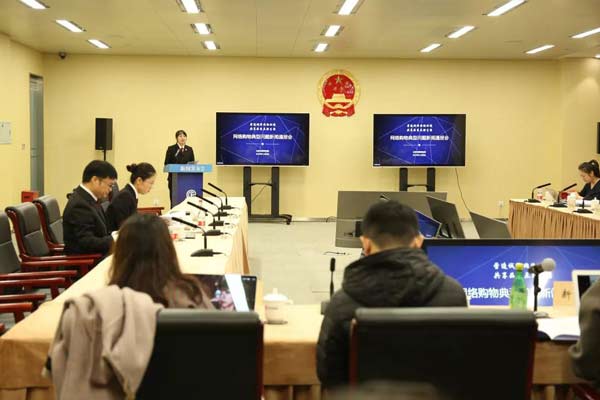Beijing Internet Court handles disputes to boosts online shopping
China's Double 11 shopping spree has fueled online shopping desire of consumers, but it has also led to shopping disputes. In response, and to ensure an honest online shopping environment, the Beijing Internet Court gave suggestions at a news conference about online shopping held on Nov 8.

Beijing Internet Court holds a news conference on online shopping disputes on Nov 8. [Photo/Beijing Internet Court]
At the conference, the court introduced statistics and actual cases of online shopping disputes, including those arising from product quality issues and problems of behaviors of online business operators and consumers. The court proposed countermeasures for the problems occurred in the online shopping process.
As of Oct 31, 2019, the Beijing Internet Court has received 42,099 cases since its establishment on Sept 9, 2018, of which 4,838, or 12 percent, were online shopping disputes.
Young males play a larger share in online shopping dispute litigation, said the court. The plaintiffs were from 29 provinces across the country and the defendants were mainly in Beijing and provinces of Guangdong, Zhejiang and Jiangsu. E-commerce platforms are significantly involved in litigation, with the online e-commerce platform JD.com accounting for the largest number of litigation cases, exceeding more than 20 percent of the total. Other platforms such as Taobao, Suning, Amazon, and Pinduoduo were also involved in a number of litigation cases.
Product quality, business operators' behavior and consumer behavior are three main reasons for online shopping disputes, which often occur in the sectors of food, health care products, traditional electronic products, cosmetics, home furnishing, apparel and accessories, and new products such as drones, electric balancers, and cloud storage devices.
Operator's unregulated business behaviors, such as improper distribution of commodity information, ambiguous interpretation of preferential rules, unauthorized changes, order cancellations, and logistics issues, are often behind the disputes.
Consumers are the plaintiffs in the vast majority of litigation cases, but they are also accused of abusing the right to return goods freely and giving malicious bad reviews, said the court.
The Beijing Internet Court added that it will explore the main causes of online shopping disputes to encourage consumers, e-commerce platforms and operators to work together to reduce the occurrence of online shopping disputes and create a harmonious and orderly Online shopping environment.

 Judicial White Paper
Judicial White Paper
 Play
Play Play
Play Online Lawsuit Guide
Online Lawsuit Guide Beijing Internet Court Lawsuit Service WeChat Account
Beijing Internet Court Lawsuit Service WeChat Account  Beijing Internet Court WeChat Account
Beijing Internet Court WeChat Account